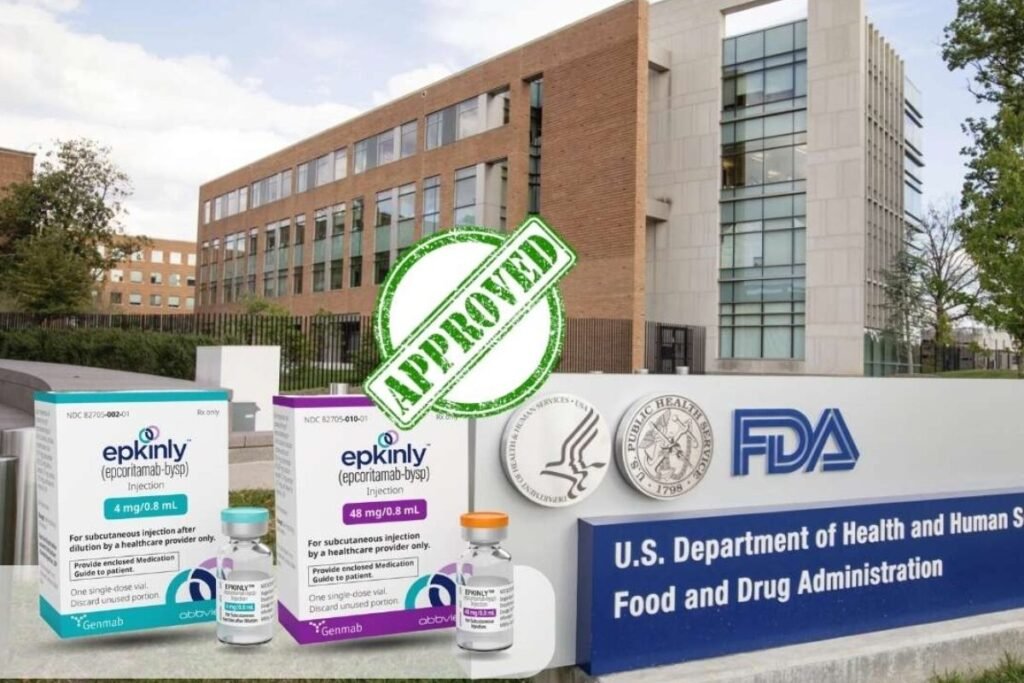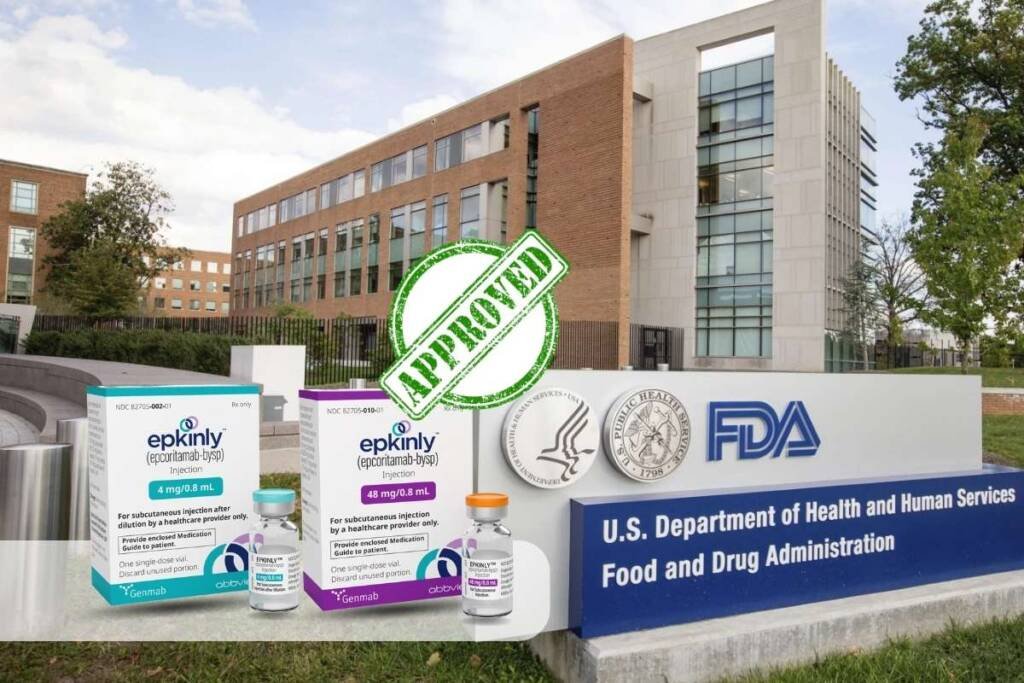In the world of cancer treatment, groundbreaking advancements are constantly being made, offering new hope for patients and their loved ones. The latest game-changer is Epcoritamab , a revolutionary therapy recently approved by the FDA. This cutting-edge treatment is set to revolutionize the way we approach cancer, particularly in patients with relapsed or refractory B-cell malignancies. Epcoritamab harnesses the power of bispecific antibody technology, targeting CD3 and CD20 proteins present on cancerous B-cells. By engaging the immune system and directing it to attack cancer cells, Epcoritamab has shown remarkable efficacy and safety in clinical trials.
This approval marks a significant milestone in the fight against cancer, offering new hope and potentially life-saving results for patients who have exhausted other treatment options. With its potential to transform the landscape of cancer therapy, Epcoritamab is undoubtedly a game-changer in the field, paving the way for more innovative and effective treatments in the future.

Understanding The Significance Of FDA Approval For Cancer Treatments
The FDA approval process is a rigorous and meticulous evaluation of a drug’s safety and effectiveness. It serves as a crucial checkpoint to ensure that new treatments meet the highest standards before they can be prescribed to patients. FDA approval is a significant milestone for any cancer treatment, as it validates the years of research and development that have gone into its creation. It provides reassurance to healthcare professionals and patients alike that the treatment has undergone thorough scrutiny and has demonstrated positive results in clinical trials. Epcoritamab’s FDA approval signifies that it has met these stringent requirements, making it a promising option for cancer patients.
Epcoritamab’s Mechanism Of Action In Targeting Cancer Cells
Epcoritamab’s mechanism of action lies in its ability to target cancer cells with precision. It is a bispecific antibody that binds to both CD3 and CD20 proteins. CD20 is expressed on the surface of B-cells, including cancerous B-cells, while CD3 is present on T-cells, a key component of the immune system. By binding to both proteins simultaneously, Epcoritamab brings the T-cells into close proximity with the cancer cells, activating the immune response. This immune activation triggers the destruction of cancerous B-cells, leading to their elimination from the body. Epcoritamab’s unique mode of action allows for a targeted attack on cancer cells, minimizing damage to healthy cells and reducing side effects.
Clinical Trials And Research Behind Epcoritamab’s Approval
The FDA approval of Epcoritamab is the culmination of extensive clinical trials and research. The trials involved patients with relapsed or refractory B-cell malignancies, a challenging population that had exhausted other treatment options. The results of these trials were highly promising, demonstrating both the efficacy and safety of Epcoritamab. In one study, Epcoritamab achieved an overall response rate of 63% in patients with relapsed or refractory diffuse large B-cell lymphoma, a prevalent and aggressive form of cancer. Additionally, the therapy showed durable responses, with some patients achieving complete remission. These findings provided compelling evidence for the FDA to grant approval for Epcoritamab , recognizing its potential to improve patient outcomes.
Benefits And Potential Impact Of Epcoritamab On DLBCL Patients
The approval of Epcoritamab brings hope and potential life-saving benefits to cancer patients, particularly those with relapsed or refractory B-cell malignancies. This groundbreaking therapy offers a novel treatment approach that harnesses the power of the immune system to target and destroy cancer cells. By engaging the body’s natural defense mechanisms, Epcoritamab has the potential to achieve long-lasting remissions and improve overall survival rates. Moreover, Epcoritamab’s targeted mechanism of action minimizes side effects, enhancing the quality of life for patients undergoing treatment. The approval of Epcoritamab opens up new possibilities for patients who have exhausted other options, providing a much-needed ray of hope in their cancer journey.
Comparing Epcoritamab To Existing Cancer Treatments
While Epcoritamab represents a significant advancement in cancer treatment, it is essential to compare it to existing therapies to fully understand its impact. Traditional cancer treatments, such as chemotherapy and radiation, are associated with significant side effects and can cause damage to healthy cells. In contrast, Epcoritamab’s targeted approach minimizes these adverse effects, resulting in a more favorable side effect profile. Additionally, Epcoritamab has shown remarkable efficacy in clinical trials, surpassing the response rates observed with certain existing treatments. However, it is important to note that each patient’s treatment journey is unique, and the choice of therapy should be based on individual factors and the expertise of healthcare professionals.
Future Prospects And Developments In Cancer Treatment With Epcoritamab
The FDA approval of Epcoritamab paves the way for a new era in cancer treatment. With its success, researchers and pharmaceutical companies are likely to explore and develop more bispecific antibodies targeting different cancer types. The field of immunotherapy continues to evolve rapidly, and Epcoritamab’s approval highlights the potential of this approach in treating various malignancies. Further research and clinical trials will likely focus on optimizing treatment regimens, identifying biomarkers for patient selection, and investigating combination therapies to enhance Epcoritamab effectiveness. The future looks promising, as Epcoritamab sets the stage for more innovative and effective treatments in the ongoing battle against cancer.
Challenges And Considerations In Implementing Epcoritamab In Clinical Practice
While the FDA approval of Epcoritamab is undoubtedly a cause for celebration, there are challenges and considerations that need to be addressed for its successful implementation in clinical practice. One such challenge is the cost of therapy, as innovative treatments often come with a higher price tag. It is important for healthcare systems and insurance providers to ensure access to Epcoritamab for eligible patients. Additionally, healthcare professionals will need specialized training to administer and monitor patients receiving Epcoritamab to ensure optimal treatment outcomes. To overcome these challenges, collaboration between stakeholders, including pharmaceutical companies, healthcare providers, and policymakers, is crucial.
Epcoritamab’s Market Potential And Implications For The Pharmaceutical Industry
The FDA approval of Epcoritamab not only has significant implications for cancer patients but also for the pharmaceutical industry. Epcoritamab’s success highlights the value of innovative therapies and the potential for substantial market growth. Pharmaceutical companies are likely to invest in the development of similar bispecific antibodies, opening up new opportunities for research and commercialization. The approval of Epcoritamab also underscores the importance of collaboration between academia, industry, and regulatory authorities in advancing cancer care. The pharmaceutical industry will continue to play a vital role in driving innovation and bringing life-saving treatments to patients in need.
Conclusion And Final Thoughts On Epcoritamab’s Fda Approval
The FDA approval of Epcoritamab marks a significant milestone in the fight against cancer. This groundbreaking therapy offers new hope and potentially life-saving results for patients with relapsed or refractory B-cell malignancies. By harnessing the power of bispecific antibody technology, Epcoritamab activates the immune system to target and destroy cancer cells. Its approval not only validates years of research and clinical trials but also opens up new possibilities for the future of cancer treatment. However, challenges such as cost and implementation need to be addressed to ensure widespread access to this innovative therapy. With Epcoritamab leading the way, the future of cancer treatment looks brighter than ever, promising improved outcomes and a renewed sense of hope for patients and their loved ones.





























